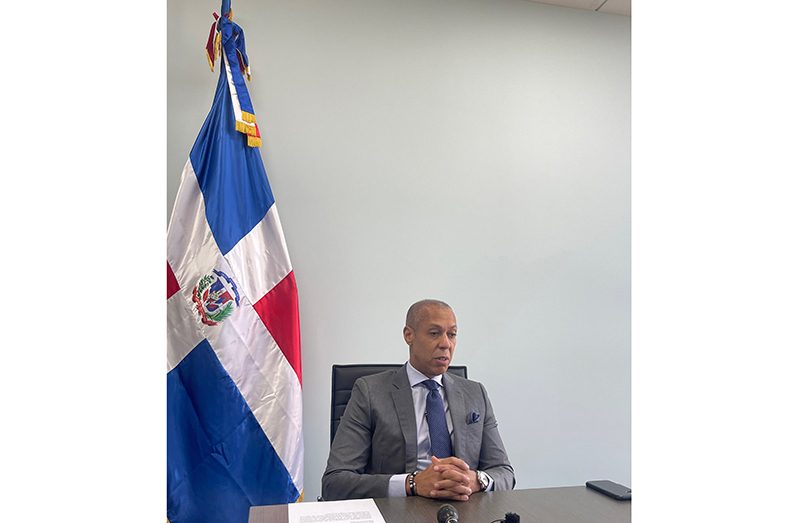Guyana/Venezuela border controversy…
WITH Venezuela once again attempting to advance its spurious claim over Guyana’s Essequibo region, Dominican Republic (DR) Ambassador to Guyana, Ernesto Torres-Pereyra, has firmly stated that international mechanisms are the only viable way to solve situations such as these.
He said this during an interview on Saturday at the DR Embassy located at the Pegasus Hotel, Seawall Road, Kingston.
“Any action that can be a factor to alter the peace in the region is a matter of great concern,” the ambassador said.
He added: “And we believe that the international mechanisms are the only viable way of solving such a situation.”
This comes as a response to the adoption of a law by Venezuela’s National Assembly declaring the Essequibo region of Guyana, which constitutes more than two thirds of the national territory, to be a constituent part of Venezuela.
Moreover, in a statement on Friday, the Government of Guyana through the Ministry of Foreign Affairs and International Co-operation called on the international community to uphold the rule of law by rejecting Venezuela’s illegal expansionism and by insisting that Venezuela revert to the International Court of Justice which has before it the case for a full and final resolution of the controversy over the land border between the two countries.
It also stated that Venezuela’s action is a “flagrant violation” of Guyana’s sovereignty and territorial integrity and is in breach of the fundamental principles of international law enshrined in the United Nations Charter.
The Guyana Government also said that it is an “egregious violation” of the Order on provisional measures issued by the International Court of Justice on December 1, 2023; and it is a violation of the Argyle Declaration of December 14, 2023, agreed to by the leaders of CARICOM and Brazil, the representative of the United Nations Secretary-General and by the Presidents of Guyana and Venezuela.
It further read: “Guyana remains committed to peace on its borders and in the region. It will not allow its sovereignty and territorial territory to be usurped. Guyana will exert all of its efforts under international law to ensure that its sovereignty and territorial integrity remain intact.”
The genesis of the border controversy goes back to the 1899 Arbitral Award, a landmark decision that delineated the land boundary between British Guiana (now Guyana) and Venezuela.
Despite the historic arbitration, tensions have persisted, with Venezuela repeatedly challenging the validity of the award.
In 2018, Guyana took a decisive step by approaching the ICJ seeking affirmation of the award’s legitimacy.
Venezuela, taking a defiant stance, initially claimed that the ICJ lacked jurisdiction, a contention flatly rejected by the World Court in a crucial ruling
in December, 2020. The door was thus opened for the ICJ to delve into the merits of the substantive case.
Recent developments have heightened the geopolitical situation, as Venezuela, through its National Electoral Council, unveiled plans for a “Consultative Referendum” on December 3.
Guyana contends that this move is a thinly veiled attempt by Venezuela to gather support for abandoning the ongoing ICJ proceedings, and unilaterally assert control over the Essequibo region.
Rodriguez has expressed her nation’s complete disregard for the ICJ’s authority in addressing the border controversy.
The substantive case which highlights the historical context and the 1899 Arbitral Award, remains before the World Court.












